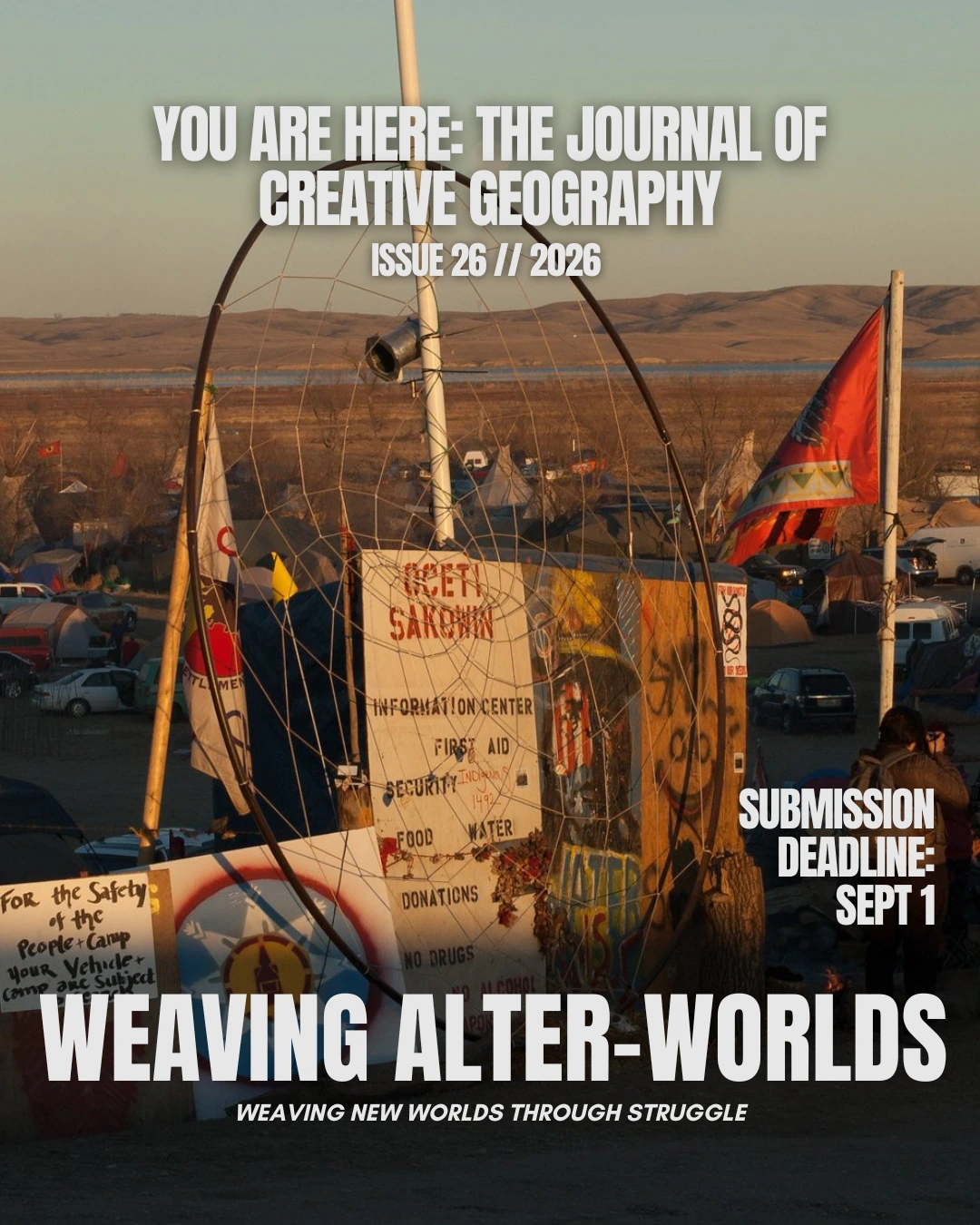
you are here: the journal of creative geography
Call for submissions 2026!
Hello from the new you are here team: Ryan Fatica (Seal) and Diana Khaziakhmetova!
We are excited to announce the theme of our 2026 issue: Weaving Alter-Worlds. This issue explores the act of weaving as a metaphor for crafting interconnected futures that resist colonial domination and hegemonic space. We invite contributions that engage with Indigenous, decolonial, and community-based practices that subvert oppressive systems by creating, nurturing, and imagining alternative worlds.
We welcome academic and experimental formats, visual art, poetry, essays, cartographies, and other media that speak to the theme.
Submission Deadline: September 1, 2025
Submit via Google Form: https://forms.gle/stYdra8zRFiKQHhM9
Submission Guidelines: https://geography.arizona.edu/submission-process-guidelines
Questions? Reach out to us at: liveandfight@arizona.edu and khaziakhmetova@arizona.edu
Let’s weave worlds together.
— Ryan & Diana
“With their roots in riverside wetlands, both black ash and sweetgrass are neighbors on the land. They are reunited as neighbors in the Mohawk baskets… Sweetgrass coils around the basket rim and threads the lids, so that even an empty basket contains the smell of the land, weaving the link between people and place, language and identity.”
– Robin Wall Kimmerer, Braiding Sweetgrass: Indigenous Wisdom, Scientific Knowledge and the Teachings of Plants (2013)
“Resurgence is hope for me because of its simultaneous dismantling of settler colonial meta-manifestations and its reinvigoration of Indigenous systemic alternatives— alternatives that have already produced sustainable, beautiful, principled societies. Yet we need more visioning, thinking, acting, and mobilization around these Indigenous systemic alternatives because creating the alternative is the mechanism through which freedom can be achieved… This requires less engagement with the state and more presence within Indigenous realities. This requires struggle and commitment.”
– Leanne Betasamosake Simpson, As We Have Always Done: Indigenous Freedom Through Radical Resistance (2017)
“An alter-world is an autonomous spatial machine: made of interlocking parts, spaces, flows, humans, gears, rivers, airs, roads, animals, seeds, electricity. And it is alive: with humans and other animals working the land, and the land working both. Alter-worlds enable us to exercise autonomy, celebrate liberty, reclaim and protect our communities, and enjoy the pleasure of simple human dignity. An alter-world is not just a space-time or a location on a map: it is also a mode of existence, a way of being-in-the-world. Alter-worlds are alternative geographies to capitalist realism and its toxic subjectifications—they are autonomous territories where people freely associate to work, live, and care for each other.”
– Marv Waterstone and Ian Shaw, Wageless Life: A Manifesto for a Future Beyond Capitalism (2019).
“The more carefully one examines space, considering it not only with the eyes, not only with the intellect, but also with all the senses, with the total body, the more clearly one becomes aware of the conflicts at work within it, conflicts which foster the explosion of abstract space and the production of a space that is other.”
-Henri LeFebvre, The Production of Space (1974).
“A common error…is to mistake the apparent stability of the natural and built environments for immutability….Orientation in a landscape is the way in which the body experiences the world around it, thereby coming to know itself as an individual. Its power arises from the fact that space is lived and not merely perceived in a cognitive manner…they are literally where people come to know their place. If space were conceived abstractly, it would be possible to change one’s mind, but given that space is lived it becomes necessary to change reality.”
-Margaret Kohn, Radical Space: Building the House of the People (2003).
For the 2026 issue of you are here: the journal of creative geography, we invite you to submit:
- Counter-hegemonic forms of geographical kinship representation, including work in Indigenous cartography, critical GIS, counter-mapping, anti-mapping, critical remote sensing, critical cartography, post- and de-colonial mapping, feminist visualization, story mapping, and creative cartography.
- Art and creative writing that challenges and/or reimagines dominant spatial imaginaries, including those of the body, the city, the landscape, the nation-state, the transnational, the global, the mind and memory, and other geographic locations and formations that impact relationship building.
- Multimodal responses that engage a mapping of reciprocity, re(they)(ma)titration, and explorations of kinship cartographies across and beyond species.
- Creative work of all genres that uses geographic concepts, representations, and tools to imagine and bring into being other worlds and otherwise ways of relating and produces new and critical ways of visualizing, representing, and performing space, place, and the geographic imagination as it relates to kinship networks understood broadly.
We accept submissions in the form of: creative nonfiction, fiction, essays, poetry, performance, film, maps, multimedia, visual art, digital art, sound art, and any other genre you can imagine, create, and submit. Submissions can be authored by individuals, collaborations, or collectives. Please see our submission guidelines for details and be sure to submit a cover sheet with your submission (provided on our submissions guidelines page). Please note, if you have submitted work to our journal before, we have updated our submission process to a singular, in-depth submission form.
If you have any lingering questions about a potential submission or format, please do not hesitate to reach out to us at youarehere.arizona@gmail.com or direct message us on social media. If you would like to submit in a language other than English or Spanish, please reach out so that we can ensure reviewers fluent in that language are available.

